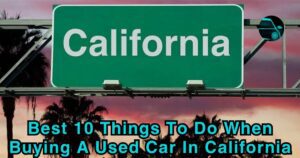Documents you should get when buying a used car encompass a range of critical paperwork, from the vehicle’s title and registration to service records and warranty information. When embarking on the exciting journey of purchasing a used car, securing the right documentation is paramount for a smooth and worry-free experience. Acquiring the proper documents ensures transparency, legal compliance, and your peace of mind throughout the transaction. In this comprehensive guide, we will explore the 24 documents you should get when buying a used car.
This essential checklist will empower you to navigate the buying process with confidence, helping you make informed decisions and avoid potential pitfalls. By understanding the significance of each document, you can safeguard yourself from unforeseen issues and set the foundation for a successful and satisfying used car purchase. Join us as we unravel the crucial paperwork, ensuring you leave no stone unturned in your quest for a reliable and well-documented pre-owned vehicle.
Documents You Should Get When Buying A Used Car
Vehicle Title: Proof of Ownership
The vehicle title, also known as the pink slip, is perhaps the most critical document. It proves ownership and includes essential details about the car, such as the Vehicle Identification Number (VIN), make, model, and current owner’s information. It’s a cornerstone among the 24 documents you should get when buying a used car, serves as indisputable proof of ownership. Documents you should get when buying a used car must include the title, a legal document crucial for transferring ownership.
Verifying the accuracy of this paperwork ensures a seamless transaction and offers a comprehensive history of the vehicle. Acquiring the title not only secures your ownership rights but also establishes a foundation of trust, transparency, and confidence in the used car purchasing process. Make obtaining the vehicle title a priority to guarantee a smooth and secure transition of ownership.
Vehicle Registration: Current and Valid
When acquiring a used car, securing the vehicle registration is paramount among the 24 documents you should get. Documents you should get when buying a used car must include a current and valid registration, affirming the vehicle’s compliance with state regulations. This essential paperwork not only verifies the car’s legality on the road but also provides insights into its maintenance and status. Ensuring the registration is up-to-date guarantees a smooth and legal transition of ownership, laying the groundwork for a confident and worry-free used car purchase.
Seller’s Identification: Confirmation of Ownership
Amidst the essential documents you should get when buying a used car, verifying the seller’s identification is imperative. Documents you should get when buying a used car must encompass the seller’s identification, confirming their ownership and legitimacy. This critical paperwork assures you that you are engaging in a legitimate transaction, enhancing trust and transparency throughout the buying process. Validating the seller’s identity is a key step in safeguarding your investment and ensuring a secure and legal transfer of ownership when acquiring a pre-owned vehicle.
Maintenance Records: Insight into Vehicle Care
Among the critical documents you should get when buying a used car, maintenance records provide valuable insights into the vehicle’s care history. Documents you should get when buying a used car include comprehensive maintenance records, offering a detailed account of service and repairs. This crucial paperwork allows you to assess the car’s health, anticipate potential issues, and make an informed purchase. Obtaining these records not only ensures transparency but also enhances your confidence in the condition of the used car, setting the stage for a reliable and satisfying ownership experience.
Vehicle Inspection Report: Professional Assessment

When acquiring a used car, don’t overlook the importance of obtaining a vehicle inspection report – a vital document among the 24 you should get. Documents you should get when buying a used car must include a professional assessment outlining the vehicle’s condition. This report provides an unbiased evaluation, highlighting any potential issues and ensuring you make an informed decision. Acquiring the inspection report adds an extra layer of assurance, allowing you to approach the purchase with confidence and clarity about the car’s overall health and performance.
Bill of Sale: Transaction Confirmation
A bill of sale is a legal document that confirms the transfer of ownership and outlines the terms of the sale. Both the buyer and seller should sign this document.
Warranty Documents: Existing Coverage
If the used car is still under warranty, obtain the warranty documents. This will detail the coverage, limitations, and any conditions for transferring the warranty to a new owner.
Owner’s Manual: Manufacturer Guidelines
The owner’s manual provides essential information about the car’s features, maintenance schedules, and recommended practices. Having this document ensures you’re well-informed about your new vehicle.
Vehicle History Report: Uncovering the Past
Request a vehicle history report from reputable services like Carfax or AutoCheck. This document discloses critical information about the car’s past, including accidents, title issues, and odometer readings.
Odometer Disclosure Statement: Mileage Confirmation
This document, required in many states, confirms the accuracy of the odometer reading. Both the buyer and seller must sign it, preventing odometer fraud.
Release of Liability: Legal Protection
Some states require a release of liability form to inform the Department of Motor Vehicles (DMV) that you are no longer responsible for the car. This protects you from any liabilities that may arise after the sale.
Sales Tax Bill: Tax Documentation
If applicable, obtain a sales tax bill or receipt. This document serves as proof of payment for the sales tax associated with the purchase.
Emissions Certification: Compliance Documentation
In regions with strict emissions standards, ensure that the used car has an emissions certification. This confirms that the vehicle complies with environmental regulations.
Loan Payoff Letter: Outstanding Loan Clearance

If the seller had a loan on the car, request a loan payoff letter from their lender. This document verifies that the loan has been fully paid, and there are no outstanding balances.
VIN Plate: Verification of Vehicle Identity
Check the VIN plate on the car’s dashboard or door frame. It should match the VIN on the title and other documents, confirming the vehicle’s identity.
Insurance Documents: Immediate Coverage
Before driving the car off the lot, ensure you have insurance coverage. Obtain the necessary insurance documents, including the policy details and proof of coverage.
Temporary Operating Permit: Legal Temporary Authorization
In some cases, you may need a temporary operating permit to drive the car legally while awaiting registration. Check with your local DMV for requirements.
Previous Bill of Sale: Chain of Ownership

If there were previous owners, request copies of the bill of sale from each transaction. This establishes a clear chain of ownership.
Lien Release: Ensuring Clear Title
If the car had a previous lien, obtain a lien release document. This ensures that there are no outstanding financial claims on the vehicle.
Smog Certification: Compliance with Emissions Standards
In areas with stringent emissions standards, ensure that the used car has a current smog certification. This verifies compliance with local air quality regulations.
Notarized Seller’s Affidavit: Additional Confirmation
Some states require a notarized seller’s affidavit, providing additional confirmation of the seller’s identity and authorization to sell the car.
Power of Attorney (if applicable): Authorized Representation
If the seller is unable to be present for the transaction, a power of attorney document authorizes someone else to represent them legally.
Affidavit of Ownership Transfer: State-Specific Requirement
Some states may require an affidavit of ownership transfer, serving as an additional confirmation of the change in ownership.
Local DMV Forms: State-Specific Requirements
Check with your local DMV for any specific forms or documentation required in your state. Compliance with these requirements is essential for a legal and smooth transaction.
Conclusion: A Well-Documented Transaction
In conclusion, the meticulous acquisition of the 24 documents you should get when buying a used car is the bedrock of a successful and secure vehicle purchase. Throughout this guide, we’ve delved into the vital paperwork, from titles and registrations to maintenance records and warranty information. Documents you should get when buying a used car are not mere formalities; they are the keys to a transparent and trustworthy transaction. By prioritizing these documents, you fortify your understanding of the vehicle’s history, maintenance, and legal standing. This thorough approach ensures that you’re not only making an informed decision but also protecting yourself from potential complications down the road.
As you embark on your journey to acquire a pre-owned vehicle, arm yourself with the knowledge and documentation necessary for a seamless and satisfying experience. The diligence in securing these documents sets the stage for a confident and well-informed purchase, allowing you to drive away with both a reliable car and peace of mind. For more tips like this check out our Buying Guides & Tips page
Frequently Asked Questions
Q1: Why is a bill of sale important when buying a used car?
A bill of sale is a legal document that confirms the transfer of ownership and outlines the terms of the sale. It serves as proof of the transaction and protects both the buyer and seller by documenting the agreed-upon terms.
Q2: What is the purpose of an emissions certification when buying a used car?
An emissions certification confirms that a vehicle complies with local environmental regulations. It ensures that the car meets established emissions standards, contributing to air quality and environmental protection.
Q3: Why do I need a VIN plate verification when buying a used car?
Verifying the VIN plate ensures that the vehicle’s identification number matches the VIN on the title and other documents. This confirmation prevents issues related to identity theft or fraud and establishes the car’s authenticity.
Q4: Is a vehicle history report necessary when buying a used car?
A vehicle history report is crucial when buying a used car as it provides comprehensive information about the vehicle’s past, including accidents, title issues, and odometer readings. It helps buyers make informed decisions and avoid




